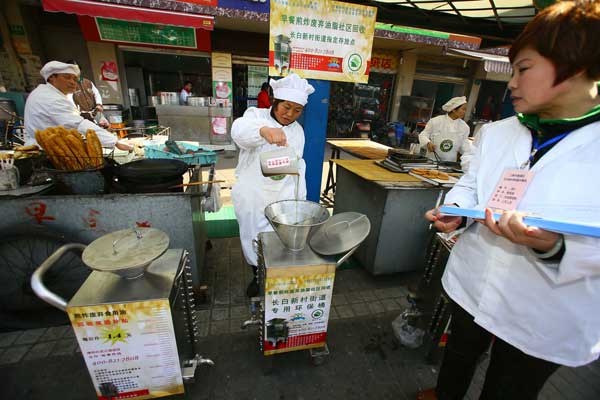

University experts say new kit can test purity in one minute
Chinese scientists say they have made a major breakthrough in the battle against "gutter oil" — illegal cooking oil recycled from waste oil collected from sources such as restaurant fryers and drains.
Experts at the University of the Chinese Academy of Sciences have unveiled a kit that can test the purity of cooking oil in one minute.
 |
|
A community worker (center) in Shanghai recycles used cooking oil on March 6. Public concern over illegal oil pushed Chinese scientists to find ways to fight against "gutter oil".?Wu Kai / for China Daily |
The breakthrough comes as authorities continue to crack down on the illegal collection and reselling of waste oil to restaurants and supermarkets.
The test kit works by placing a small sample of any cooking oil in a test tube with a burgundy-colored reagent and then shaking them, co-creator He Yujian said.
"If the color doesn't change, the oil is safe," he said. However, if it becomes lighter, the mixture can be compared with a color chart that shows the severity of the contamination.
The change can be seen if the proportion of illegal oil in the sample is 5 percent or more, the professor of chemistry and chemical biology said.
For sellers of illegal oil to make a profit, the proportion of recycled oil in their products needs to be at least 5 to 10 percent, He said, adding that the test kit is suitable for most oils on the market in China.
The university team has spent nearly two years developing the reagent, with the aim of making detection easy, fast and cheap.
The professor said he is looking for an enterprise to manufacture the kit.
"I'm a scientist, so I don't know how to market a product. But the method is already mature," he said. "I'd say if any company was interested, it would take less than a month for industrial manufacture."
The term "gutter oil" usually refers to oil collected by using three illegal methods — oil skimmed from kitchen wastewater, oil reused several times by a kitchen (such as from a deep-fat fryer) and oil extracted from animal fat.
"All illegal cooking oil contains molecules that do not exist in normal oil," He said. "So we created a reagent that reacts with these molecules and changes color."
Most other detection methods require sophisticated laboratory instruments, He said.
"But it's simply not possible for law enforcement officials to take huge instruments with them when they conduct routine checks at small restaurants and markets."
Public concern over illegal oil began to grow in 2011 when police cracked a cross-province case. But a laboratory test could identify only two out of 10 oil samples from the illegal workshops.
By May last year, the Ministry of Health (later merged to form the National Health and Family Planning Commission), had received 762 proposed methods from the public for detecting illegal cooking oil.
The commission chose seven — four laboratory methods and three immediate tests, without disclosing the methods to the public.
However, at least one expert is not confident about testing illegal oil.
"Illegal oil is especially complex to detect," Liu Zhihong, a chemistry professor at Wuhan University, was quoted as saying by Nanfang Daily.
Liu said there is no flawless method yet to recognize all illegal oil. Some methods, like nuclear magnetic resonance and gas chromatography, are too time-consuming and too expensive.
But He, from the University of the Chinese Academy of Sciences, said, "Based on laboratory results, our reagent has an accuracy rate of about 96 percent, which is enough for initial inspection and detection."
He estimated the cost for each test using the reagent to be no more than 0.5 yuan ($8 cents).
Meng Lingren, 20, a consumer from Beijing, is not confident about the reagent being available to individual buyers.
"Richer families prefer buying big brands or imported products, while people with lower incomes generally may care less about the oil quality," he said.
Meng believes the reagent alone is far from sufficient to protect consumers.
"The quality test, although with good intentions, will have little effect if there are no channels for individual consumers to complain about the gutter oil they find, along with severe punishment for the manufacturers," he said.
Jiang Mengyun contributed to this story.